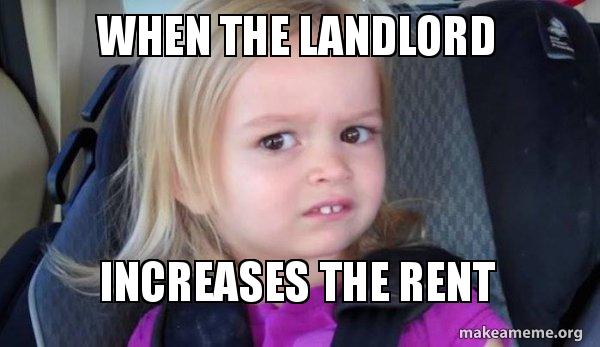What are my rights as a tenant?

Is your landlord increasing your rent by an absurd amount? Are they threatening to kick you out of your living space for a ridiculous reason? If you want to learn some more about legal rent increase and the legal eviction process—or get in contact with someone who can give you legal advice—then read the article below.
So, I rent in San Francisco. What are my rights as a tenant?
Article written by Elizabeth Soriano – July 2nd 2025.
According to the San Francisco Administrative Code, Residential Rent Stabilization and Arbitration Ordinance Section 37.2 (t) states that a tenant is “[a] person entitled by written or oral agreement, sub-tenancy approved by the landlord, or by sufferance, to occupy a residential dwelling unit to the exclusion of others.”1 If you have an agreement, in writing or verbal, with a landlord to live in a residential dwelling unit (apartment, studio, in-law suite, house, etc.), then you are considered a tenant. A landlord is defined as “[an] owner, lessor, sublessor, who receives or is entitled to receive rent for the use and occupancy of any residential rental unit or portion thereof in the City and County of San Francisco, and the agent, representative or successor of any of the foregoing.”1
Can my landlord increase my rent however much they want, whenever they want?
There are protections in place for tenants so that landlords can’t drastically increase rent whenever they feel like it. For many residential units built on or before June 13, 1979, they have both rent control and eviction protection regulations.2,3 According to the City and County of San Francisco, a landlord must follow the following criteria to increase rent2:
- Report into the Rent Board Housing Inventory to obtain a rent increase license.4
- Give a tenant a 30-day written notice of the proposed rent increase (note: if the increase [either by itself or combined with another increase in the same year] is more than 10%, than a 90-day written notice is required)
- The rent increase notice should include the dollar amount of the increase, the percentage amount of the increase, and the date the increase will go into effect.
Effective March 1, 2025 through February 28, 2026, the allowed rent increase percentage on most units built before June 14, 1979 is 1.4% (based on the tenant’s base rent).2 Every 12 months, your landlord can increase your rent by the percentage set by the City and County of San Francisco—which is currently 1.4%. Your landlord may choose to “skip” a rent increase for one 12-month period and may add or “bank” it onto the next rent increase period (after another 12 months). To verify if your unit has rent control or eviction protection regulations, speak with a Rent Board counselor (call for phone counseling: 415-252-4600).5

Can my landlord kick me out of the residential unit I rent whenever they want?
Like with rent control, there are also protections in place so that landlords can’t kick tenants out of a unit whenever they feel like it. Eviction is a legal process of removing a tenant from a residential unit, and the landlord must follow the step-by-step process as described by the City and County of San Francisco and the Superior Court of San Francisco County for it to be considered legal. 6,7 Generally, the eviction process requires the following to occur:
- The landlord must present the tenant with a notice to terminate tenancy. There are different kinds of notices (for nonpayment, substantial nuisance, breach of lease, etc.), and they can be 3 days, 10 days, 30 days, 60 days, or 120 days.8 Different notices have different requirements and notices may be extended in certain circumstances. For more information on eviction notice requirements, visit the City and County of San Francisco's website or the Superior Court’s website.8,9
- After giving the tenant a written notice, the landlord must file a Summons & Complaint for Unlawful Detainer with the Superior Court of San Francisco County; which gives them the right to take back the residential unit from the tenant.10 According to the Superior Court, one of two outcomes may occur:
- “If the tenant, or a tenant representative responds, then the matter goes to court. As the response is a legal procedure it is recommended that tenants speak with an attorney for legal advice.”6
- “If the tenant does not respond within 10 days, not counting weekends or holidays, they may receive a default judgment. The tenant loses automatically in that circumstance.”6
NOTE: The City and County of San Francisco recommends contacting the Eviction Defense Collaborative at (415) 659-9184 if you have received a Summons & Complaint for Unlawful Detainer.11
- The eviction may be set for trial. Generally, about a week before the trial date, both parties will meet for a Mandatory Settlement Conference to possibly settle the conflict if both parties can come to an agreement. If no agreement/settlement is made, then the eviction will go to trial at a date determined by the courts. An eviction trial has two outcomes, decided by the judge:
- The tenant wins6: If the tenant wins their case, the tenant gets to stay in their residential unit and does not have to vacate. The tenant may be able to recover the cost of suit or attorney's fees; however, this is a legal matter that should be discussed with an attorney.
- The tenant loses6,12: If the tenant loses their case, the decision is issued against the tenant, a sheriff will be notified, and the landlord will be issued a Judgment of Possession that gives the landlord possession (ownership) of their property. From here, a tenant will receive a Sheriff's Notice to Vacate on their door with information on the time and date of the eviction. On the determined eviction date, the sheriff could remove the tenant from the property—if they haven’t vacated already—and lock them out by changing the lock. The landlord cannot immediately dispose of the tenant’s possessions; however, temporary storage of the tenant’s possessions can be arranged, and the tenant may be charged.
- It is highly advised for a tenant to get legal advice if they would like to request a “stay of execution” to postpone the Sheriff’s eviction, as this will need to be approved by a judge at a hearing and requires the tenant to pay their landlord for the time they are approved to stay.12,13
For general questions about the eviction process (regarding notices, just causes for eviction, etc.) or a referral to someone that can help with your specific situation, you can reach out to the Rent Board (call for phone counseling: 415-252-4600); however, it’s important to note that they cannot give you legal advice.5,14 Since evictions are handled at Superior Court, for situation-specific questions and legal assistance, check out the Superior Court’s list of free legal help and housing resources.15

References
- City and County of San Francisco. San Francisco administrative code, chapter 37: residential rent stabilization and arbitration ordinance. American Legal Publishing, https://codelibrary.amlegal.com/codes/san_francisco/latest/sf_admin/0-0-0-15949, Amended June 23, 2025. Accessed July 2, 2025.
- City and County of San Francisco. Learn about rent increases in San Francisco. sf.gov, https://www.sf.gov/learn-about-rent-increases-san-francisco, Accessed July 2, 2025.
- City and County of San Francisco. Evictions in San Francisco. sf.gov. https://www.sf.gov/evictions-san-francisco, Accessed July 2, 2025.
- City and County of San Francisco. The rent board housing inventory. sf.gov, https://www.sf.gov/rent-board-housing-inventory, Accessed July 2, 2025.
- City and County of San Francisco. Rent board. sf.gov, https://www.sf.gov/departments--rent-board, Accessed July 2, 2025
- City and County of San Francisco. The eviction process. sf.gov, https://www.sf.gov/step-by-step--eviction-process, Accessed July 2, 2025
- California Courts Self-Help Guide. The eviction process for tenants. California Courts Judicial Branch of California, https://selfhelp.courts.ca.gov/eviction-tenant, Accessed July 2, 2025.
- City and County of San Francisco. General eviction notice requirements. sf.gov, https://www.sf.gov/information--general-eviction-notice-requirements, Accessed July 2, 2025.
- California Courts Self-Help Guide. If you get a notice. California Courts Judicial Branch of California, https://selfhelp.courts.ca.gov/eviction-tenant/notice, Accessed July 2, 2025.
- California Courts Self-Help Guide. Evictions (residential). California Courts Judicial Branch of California, https://sf.courts.ca.gov/self-help/evictions, Accessed July 2, 2025.
- Eviction Defense Collaborative. Legal assistance. EDC, https://evictiondefense.org/legal-assistance-services/, Accessed July 2, 2025.
- California Courts Self-Help Guide. What happens if you lose your eviction case. California Courts Judicial Branch of California, https://selfhelp.courts.ca.gov/eviction-tenant/lose-case, Accessed July 2, 2025.
- California Courts Self-Help Guide. Ask for more time to move. California Courts Judicial Branch of California, https://selfhelp.courts.ca.gov/eviction-tenant/lose-case/ask-more-time, Accessed July 2, 2025.
- City and County of San Francisco. Rent board referral listing. sf.gov, https://www.sf.gov/reports--january-2025--rent-board-referral-listing, Accessed July 2, 2025.
- California Courts Self-Help Guide. Legal and housing resources. California Courts Judicial Branch of California, https://selfhelp.courts.ca.gov/eviction-resources, Accessed July 2, 2025.
- Make a Meme.org. Side-eyes chloe when the landlord increases the rent. https://makeameme.org/meme/when-the-landlord-5bb2b8, Accessed July 2, 2025.
- NBC4 Staff. ‘Guess who’s moving? you!’: landlord’s eviction notice to tenant goes viral. WWLP, https://www.wwlp.com/news/world/guess-whos-moving-you-landlords-eviction-notice-to-tenant-goes-viral/, Published July 22, 2018. Accessed July 2, 2025.
Tags



